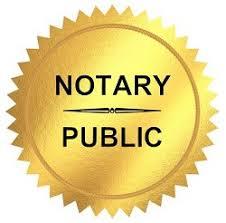Demystifying Notarial Job: Simplifying the Duty and Importance of Notaries
In the complex internet of legal paperwork and confirmation, notaries stand as pillars of assurance and credibility. Their duty, usually shrouded in secret for several, lugs substantial weight in ensuring the credibility and integrity of vital records. As guardians of legality and reality, notaries play a critical component in our society, yet their job is not always totally understood. By unwinding the complexities bordering notarial methods and losing light on the importance of their acts, a clearer understanding arises of the vital function notaries play in maintaining the textile of lawful and legal contracts.
The History of Notarial Work
The history of notarial job days back to ancient worlds, where scribes played a crucial duty in tape-recording crucial details and verifying papers. This led to the advancement of notaries, individuals designated by the state to act as impartial witnesses in legal matters.
During the Middle Ages, notaries obtained prestige in Europe, with their features expanding to include preparing legal files, licensing trademarks, and maintaining documents. The rise of international profession even more emphasized the significance of notarial work in verifying contracts and arrangements throughout boundaries.
In the modern period, notaries remain to play a crucial duty in lawful and service transactions by verifying identities, confirming the credibility of files, and preventing fraudulence. Their duty in accrediting the validity of arrangements adds a layer of safety and trust to the ever-evolving landscape of commerce and regulation.

Obligations and Responsibilities of Notaries
Notaries play an important function in validating the credibility of files and the identification of notaries. One of their primary responsibilities is to witness the finalizing of important records, such as agreements, actions, and wills, to guarantee that all parties are getting in into agreements intentionally and willingly.
They license duplicates of original documents, providing assurance to establishments that the copies are real replicas of the originals. Overall, the duties and obligations of notaries are vital in protecting the integrity and validity of various files and deals - Deceased Estate.
Notarial Certificates and Signatures
Exhibiting careful focus to detail, notarial certificates and signatures act as crucial parts in validating the credibility of legal documents. Notarial certificates normally have crucial info such as the day of notarization, the names of the notaries, a summary of the document, and the notary's main seal. These certificates provide a clear record of the notarial act, guaranteeing that the record can be quickly identified and mapped back to the notary that supervised the process.
Signatures play an essential function in notarial job, More Info as they indicate the arrangement and permission of the parties involved. Notaries meticulously witness the finalizing of records to validate the identity of the signatures and confirm that they are authorizing of their very own totally free will. By fastening their official seal and trademark to the file, notaries certify that the required procedures have actually been followed and that the paper is valid and enforceable.
Fundamentally, notarial certificates and signatures are the characteristic of authenticity in lawful go to this web-site purchases, offering guarantee to all parties included that the papers are reputable and binding.
Importance of Notarial Acts

Registration Refine Explained
The registration procedure normally begins with the individual presenting the record to a notary public. When the identity is verified, the notary makes certain that the individual authorizing the document does so willingly and without any browbeating.

Final Thought

Notarial certificates commonly include vital information such as the date of registration, the names of the notaries, a summary of the record, and the notary's main seal. These certifications offer a clear document of the notarial act, guaranteeing that the paper can be quickly identified and traced back to the notary that supervised the procedure.
By attaching their main seal and signature to the document, notaries license that the essential procedures have been followed and that the record is valid and enforceable.
By confirming the identification of the signatories, validating their determination to get in into the contract, and certifying the day and place of the signing, notaries play an essential role in maintaining the credibility of legal documents.After the document is authorized, the notary will certainly fasten their main seal or stamp onto the record.